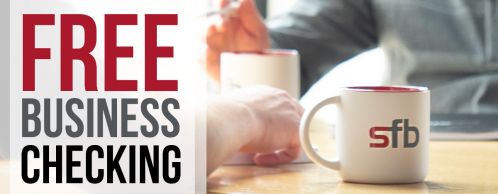
What Do Rising Interest Rates and a Slowing Economy Mean for Business?
Article By: Mark Oldenberg, SFB President & CEO
Only a few times in history have we had rising interest rates and a slowing economy - an environment that if it lasts could lead to a period of stagflation. There are many variables to consider in explaining why inflation has increased and been persistent, which has led the Federal Open Market Committee (FOMC) to raise rates. The war in Ukraine has caused lots of uncertainty in the supply chain from fertilizers to precious metals. In addition, supply chains, which have not fully recovered from the initial disruptions due to COVID-19, are now causing additional disruptions in China and the US as many people still have not returned to the workforce.
All these forces, among others, have culminated to drive inflation to levels not seen in decades. As a result, the FOMC has tried to slow the US economy, as measured by Gross Domestic Product (GDP), by raising interest rates. Inflation has proven itself to be more entrenched than many people thought, causing the FOMC to increase rates by 75 bps at its last two meetings. Current expectations are for the FOMC to raise rates another 50 to 75 bps in September as well. As a result of these actions and expectations, the economy is slowing with the first quarter of 2022 GDP measured at a negative 1.6% and the second quarter GDP measured at a negative 0.9%. Most recently, we received the latest inflation data from the Consumer Price Index (CPI) and Producer Price Index (PPI) where both measurements were lower than the previous month at 8.5% and 9.8% year-over-year, respectively.
As the FOMC has very few tools to use in reducing inflation, they will keep increasing rates until inflation declines substantially from current levels. Keep in mind the FOMC wants longer-term inflation to be closer to 2%, so there is a long way to go. Many economists believe unemployment must increase from the current 3.5% level to over 4% to slow consumer spending and get back to 2% inflation. This feedback loop of high inflation, which leads to higher interest rates, keeps increasing the odds of a US economic recession - especially now that we are seeing other world economies, namely China, slowing down as well.
I continue to believe in the long-term success of you, our customers, and SFB as we deal with short-term uncertainty together. Rely on your trusted advisors including your relationship manager at SFB to help you make informed decisions and reliable projections and together we will continue to be successful.
Mark Oldenberg, president and CEO of Security Financial Bank (SFB), has more than 25 years of experience in community banking. He earned degrees in both finance and accounting from the University of Wisconsin-Eau Claire and now serves as an Advisory Board member for UW-Eau Claire's College of Business. To contact Mark, call 888.254.0615 or email moldenberg@sfbank.com.



